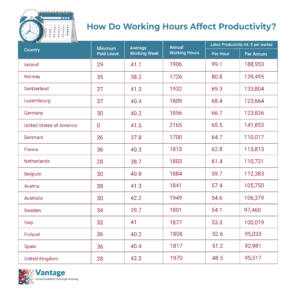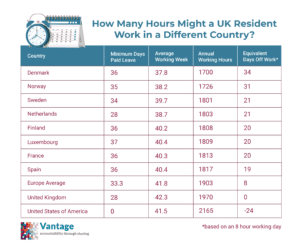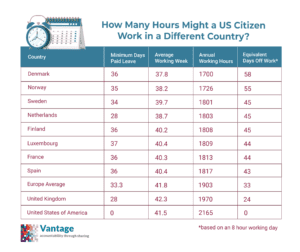New Analysis Suggests the UK Could Have a Shorter Working Week With Improved Productivity
Here are some key points that your readers may find of interest:
- Malta has the most paid leave of any country worldwide, at 40 days – 12 more than the UK – followed by Austria and Iceland with 38.
- The UK has 5.3 fewer paid days leave than the European average of 33.3 days.
- Denmark workers have the shortest week – just 37.8 hours long with 36 days of paid annual leave, compared to the UK’s 42.3 hour average working week. If a UK worker relocated to Denmark, they’d work an average of 34 days fewer a year.
- Of the 16 countries that are more productive per hour than UK workers, 15 work fewer hours annually, due to shorter working weeks and more annual leave.
- It’s not all bad news though – compared to 2000, the average UK working week is currently 1.7 hours shorter, saving the people of the UK almost 89 hours of work a year.
March 2021: Health care software provider Vantage Technologies have calculated the amount of time people across the world spend working, using OECD data on weekly working hours and government paid holiday policies. This has been compared to workforce productivity to reveal that the UK could cut weekly working hours. View the full piece here.
Which Countries Have the Shortest Working Week?
1. Denmark – 37.8 hours
2. Norway – 38.2 hours
3. Netherlands – 38.7 hours
4. Sweden – 39.7 hours
5. Lithuania – 40.1 hours
6. Finland – 40.2 hours
7. Germany – 40.2 hours
8. Latvia – 40.2 hours
9. France – 40.3 hours
10. Estonia – 40.4 hours
27. United States of America – 41.5 hours
European Average – 41.8 hours
32. United Kingdom – 42.3 hours
Denmark has the shortest working week
On average, the people of Denmark work just 37.8 hours per week – four hours less than the standard working week across Europe. Denmark consistently ranks highly on the World Happiness Report, and a healthy work-life balance is key to this sentiment among residents.
Another Nordic country, Norway, places second with an average working week of 38.2 hours, followed by the Netherlands, where residents usually work 38.7 hours a week.
Can a shorter working week and more holiday in the UK be achieved?
Arguments against changes to the working week usually relate to a lowering in productivity. So, Vantage Technologies compared average annual working hours across OECD countries, with their per hour and per annum productivity (in Labour Productivity int.-$ per worker).
This study shows that 15/16 countries more productive per hour than the UK work fewer hours annually. Working fewer hours may therefore increase a workforce’s hourly productivity, resulting in higher annual productivity from each worker than those working longer hours.
So how much could we reduce working hours by, while maintaining or increasing productivity? Research by Oxford University found that workers are 13% more productive when happy – so an 11.5% reduction in time spent at work (if that makes UK workers significantly happier) could keep productivity in the UK at the same level.
Which countries have the most paid holidays?
The Vantage team compared the number of paid public holidays falling on typical working days (excluding Easter Sunday for example) and paid annual leave days by country, to reveal where workers might receive the most paid time off. This roundup is based on OECD countries.
1. Malta – 40
2. Austria – 38
3. Iceland – 38
4. Luxembourg – 37-43
5. Denmark – 36
6. Finland – 36
7. France – 36
8. Spain – 36
9. Norway – 35
10. Portugal – 35
Europe Average – 33.3
36. UK – 28
Malta has the most holiday
Workers in Malta receive 40 days of paid leave a year – the highest amount of paid holidays across the globe. Since 2005 however, public holidays falling on a Saturday or Sunday don’t carry over to the following week, so this exact number varies yearly.
Austria and Iceland follow behind, with 38 days of paid holiday in each country. Public holidays do carry over when falling on a weekend in these countries.
The US has no legal requirements for paid holiday
The US doesn’t have any laws in place specifying a minimum amount of paid holiday allowance. Instead, the amount of paid leave is up to the employer’s discretion – but 1 in 4 workers don’t get any paid time off.
The country with the most additional holiday
Interestingly, a life in Luxembourg provides a slightly lower minimum holiday amount of 37 days – still nine more than the UK – but there are additional holidays available to certain workers. For example, if you work in the public sector, you are entitled to six additional days of holiday (43 a year). When you reach 50 years and 55 years of age, two additional annual leave days are added at each milestone. So a doctor over 55 could be entitled to 47 days of holiday per year.
Extraordinary paid leave is also allowed and not deducted from the total. Some examples include 3-6 days of paid leave for marriage, two days when moving house, 1-5 days for the death of a relative, and fathers receive ten days of paid leave for the birth of their child.
While Italy sits further down the list, with 32-33 days of paid leave, working here also has some interesting perks. Most workers receive up to 104 hours ‘Riduzione Orario di Lavoro’ or ‘Reduction of Working Hours’ – which are hours that can be taken off without a reduction in salary. These can be used for appointments, going to the bank, or just to have a few Friday afternoons off.
The Italians also receive 15 days of paid leave given to a worker when marrying. The most recent ONS figures state there were 242,842 marriages in England and Wales in 2017, equating to 3,642,630 days of paid leave in Italy.
Working hours are reducing with technology
Overall, working hours are decreasing. When comparing the average working week in 2000 to current working hours, people are working 1.5 fewer hours across Europe, based on OECD data.
The UK working week has shortened by 1.7 hours, from an average of 44 hours in 2000 to 42.3 hours currently. This saves the people of the UK almost 89 hours of work a year.
Korea has had the largest reduction in working week over the past 20 years. Workers there have gone from a whopping 53.6-hour average working week – 10.72 hours a day – to a more reasonable 45.3-hour working week, a total reduction of 8.3 hours per week. While Korea still has a work-driven culture, advancements in technology have reduced the time people spend working. The country achieved second place (behind Germany) in Bloomberg’s 2020 Innovation Index, investing 4.5% of GDP in research and development. This has transformed Korea into an R&D powerhouse, that has been able to reduce working hours while increasing productivity.
How many fewer days might a UK resident work in a different country?
Now that we’ve seen these differences in the total amount of time spent at work across the globe, how many fewer days might you work in a country with a shorter working week? The team looked at the amount of time workers spend at their desk in the countries with the fewest annual working hours, presenting the total amount of days off work (in eight hour working days). Vantage compared this result to the amount of time you may spend working in the UK and USA.
If a UK resident moved to Denmark, they would work 270 fewer hours over the course of a year, or receive 34 working days off work. A UK resident would spend 13.71% less time at work in Denmark, or receive an additional six weeks (equivalent to a UK school summer holiday) and four days of paid holiday.
Based on OECD data, a UK resident in the average European country would work eight fewer days a year. This is still almost two weeks of holiday.
A US Citizen working in Denmark may work a staggering 58 fewer days a year. That equates to 11 weeks and three days of paid time off work each year. In total, an American working in Denmark would spend 21.48% less time at work.
Martyn Goodhand, Managing Director at Vantage Technologies: “Technology has come on leaps and bounds since the 90s – most information is only a simple search away. Pre-internet, the working week was very different. From quick formulas in Google Sheets, to streamlined administration systems – the modern working day is truly more efficient and productive.
“This study also shows that more hours at work don’t necessarily increase productivity. It’s easy to sit at your desk and work through breaks, lunches and into the evening, but regular time away from your screen and some fresh air truly does benefit your productivity more than overworking.”
About Vantage Technologies
Vantage Technologies is a Sheffield-based provider of data management software modules that include multiple risk, safety, asset, and compliance products into one system. This software can be effectively utilised by any organisation or company looking to streamline their data input and retrieval procedures.
The Vantage platform provides integrated software solutions to gather and share multi-agency, multi-company, multi-disciplinary, and cross-boundary information. Furthermore, if required, they can provide a development licence, so custom software modules can be developed to your organisation’s specifications using extensive templates and datasets.
Help keep news FREE for our readers
Supporting your local community newspaper/online news outlet is crucial now more than ever. If you believe in independent journalism, then consider making a valuable contribution by making a one-time or monthly donation. We operate in rural areas where providing unbiased news can be challenging. Read More About Supporting The West Wales Chronicle





























